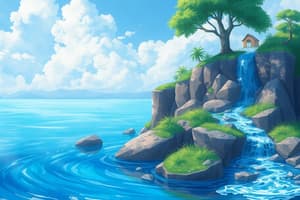Podcast
Questions and Answers
What percentage of Earth's water is fresh drinking water?
What percentage of Earth's water is fresh drinking water?
- Around 50%
- Approximately 25%
- Less than 3% (correct)
- More than 75%
How can water conservation help prevent pollution?
How can water conservation help prevent pollution?
- By wasting water in gardens
- By fixing leaks promptly (correct)
- By using more water for daily activities
- By taking longer showers
What drives the continuous movement of water in the water cycle?
What drives the continuous movement of water in the water cycle?
- Wind energy
- Hydroelectric power
- Energy from the sun (correct)
- Geothermal heat
Why is water conservation essential in a world facing climate change?
Why is water conservation essential in a world facing climate change?
What action is NOT a part of water conservation practices mentioned in the text?
What action is NOT a part of water conservation practices mentioned in the text?
What happens when forests are cleared according to the text?
What happens when forests are cleared according to the text?
How can humans disrupt the water cycle according to the text?
How can humans disrupt the water cycle according to the text?
What is one consequence of disrupting the water cycle?
What is one consequence of disrupting the water cycle?
How can individuals contribute to maintaining the delicate balance of the water cycle?
How can individuals contribute to maintaining the delicate balance of the water cycle?
What key role do governments, businesses, and organizations play in ensuring water security?
What key role do governments, businesses, and organizations play in ensuring water security?
Study Notes
Water Conservation and the Water Cycle
Water is essential for life on Earth, and yet it's also one of our most finite resources. Despite covering around three quarters of our planet, only a tiny fraction of it—less than 3%—is fresh drinking water. This means we must conserve water whenever possible to ensure its availability for both current and future generations. Here, we explore water conservation and the water cycle.
Water Conservation: Why It Matters
Water conservation involves using less water while maintaining the quality of life we enjoy today. This includes actions such as fixing leaks, taking shorter showers, and using more drought-resistant plants in gardens. By conserving water, we can reduce stress on our local environment and help prevent pollution, floods, and other water-related problems. Additionally, water conservation can save time and money by reducing the need for expensive infrastructure improvements. In a world where climate change poses threats to our water supply, water conservation becomes even more crucial for managing this precious resource.
The Water Cycle: How It Works
The water cycle refers to how water moves through the environment, from oceans and lakes to rivers and streams, back into the air, and eventually returning to the land. This continuous movement of water is driven primarily by energy from the sun, which heats up water in bodies like the ocean, causing it to rise into the sky as vapor. Once in the atmosphere, this water can fall to the ground again as rain or snow, feeding our streams, lakes, and oceans with fresh liquid water.
Understanding the water cycle helps us appreciate how important it is to protect our water sources and manage them carefully. For example, when forests are cleared, they can no longer absorb rainfall effectively, leading to increased runoff and soil erosion. Similarly, humans can disrupt the water cycle by overusing irrigation systems or pumping too much water out of underground aquifers, threatening their long term sustainability. By preserving natural habitats, promoting sustainable farming practices, and using water wisely, we can maintain the delicate balance of our water cycle and secure clean water for all.
Combining Efforts for Future Success
While individual efforts towards water conservation and understanding the water cycle are important, wider systemic changes are critical as well. Governments, businesses, and organizations all play a role in ensuring water security through measures such as investing in water infrastructure, implementing sustainable agricultural practices, and supporting public education campaigns. By combining these various strategies, we can work together to conserve and manage our water resources responsibly, safeguarding not just our own futures, but those of countless generations to come.
Studying That Suits You
Use AI to generate personalized quizzes and flashcards to suit your learning preferences.
Description
Explore the importance of water conservation and the functioning of the water cycle. Learn about actions like fixing leaks and using drought-resistant plants for conserving water, along with understanding how water moves through the environment driven by energy from the sun. Discover how individual and systemic efforts can contribute to securing clean water for future generations.




